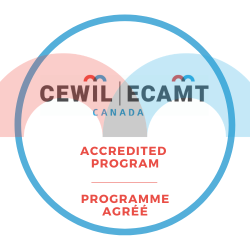Electrical Engineering Technology (Co-op)

*Domestic applicants include Canadian citizens, permanent residents, protected persons and Convention refugees.
In this program, students gain both theoretical knowledge and practical experience to enable them to work in a wide variety of areas within electrical engineering including industrial process control and power systems. Students learn about and work with PLCs, electric motors, digital systems, control automation, transformers and explore the application of technology in the industry. Senior students continue studies with telecommunication, networking, HMI, programming embedded systems, and advanced PLC applications and explore their application within industrial processes including machine and motor control, PID systems, and robotics.
Throughout the program, students will also gain experience in safety practices, safety standards, technical writing and CAD prior to their co-op which provides the student with up to 16 months of paid co-op to apply and hone their hands-on skills and theoretical knowledge in the real world before they launch into their career within the industry.
The Electrical Engineering Technology program will prepare graduates for jobs in growth areas of automation, network communications, electrical utilities/protection, process control, electronics and embedded systems. Students will study electrical system design, automation, power generation/distribution and develop practical skills. Graduates will be skilled in AutoCAD, hydraulic/pneumatic systems, PLCs, motors, electronics, programming and industrial automation. Throughout the program, students will apply this knowledge in conjunction with the Canadian Electrical Code, workplace health and safety and project management applications. Additionally, students will enhance their interpersonal and communication skills.
The Electrical Engineering Technology program offers a cooperative education component, which provides students the opportunity to gain invaluable first-hand workplace experience in their chosen field. Here are some co-op jobs that have kick-started the careers of some students before even graduating!
Electrical Controls Engineering Technician
Design, construct, test and complete preventative maintenance on a variety of electronic equipment.
Electrical Designer
Build a solid foundation with hands-on experience with senior engineers, designers, managers and mentors who will help introduce you to the industry.
Electrical Engineering
Assist with project management, machine control design, failure analysis, troubleshooting and commissioning of new installations.
For more information regarding co-op, please check out our co-op site or contact the Co-op Office at coop@fanshawec.ca to connect with a consultant.
Graduates of Fanshawe’s Electrical Engineering Technology program are very versatile and will fit right into an engineering design office with manufacturers of automated equipment or in the engineering departments of process industries such as steel, paper, plastic and chemical. Other opportunities exist with power utilities and computer and instrumentation manufacturers. Graduates generally work in design but may also be involved in technical sales, maintenance and supervision. Graduates of this program could choose to pursue a career as:
Did you know Fanshawe consistently ranks high in graduation employment rates among large colleges in Ontario?
Here are some examples of career opportunities for graduates of Fanshawe’s Electrical Engineering Technology program:
Production Engineer
Devise a production plan for how a product should be made in an efficient and safe manner that delivers excellent results with minimal errors.
Systems Design Verification Technologist
Responsible for validating industry leading broadcast and AV solutions at a system level.
Electrical Engineering Technologist
Provide the technical knowledge and skills required to initiate, plan, develop and execute new projects and ongoing maintenance.
| Fall | Winter | Summer |
|---|---|---|
| Academic Level 1 | Academic Level 2 | Academic Level 3 |
| Academic Level 4 | Academic Level 5 | Academic Level 6 |
| Co-op | Co-op | Co-op |
| Academic Level 7 |


This program is accredited by Co-operative Education and Work Integrated Learning Canada. This accreditation represents the highest standard of achievement for co-operative education programs in Canada, and recognizes Fanshawe's commitment to excellence.
The graduate has reliably demonstrated the ability to:
Henry Hegger

Join Us for Open House
Find out if Fanshawe is the right fit for you at Open House. Explore Fanshawe's campuses, meet faculty and current students, and ask your questions about starting college.
Applicants whose first language is not English will be required to demonstrate proficiency in English by one of the following methods:
| Level 1 | ||||
| Take all of the following Mandatory Courses: | ||||
| MATH-1188 | Math 1 | 4 | ||
| As the first mathematics course for technology students, the content includes fundamental algebra, systems of linear equations, quadratic equations, trigonometry, geometry and the j operator, exponents, radicals and logarithms. Applications involving problems taken from electrical/electronic technology will be covered wherever possible. | ||||
| ELEC-1130 | DC Electricity | 5 | ||
| This course introduces both theoretical and applied concepts of Direct Current (DC) electricity. It is a fundamental course where the student will identify, investigate, troubleshoot, analyze and solve resistive, capacitive and inductive circuits applying the appropriate laws, analysis methodology and network theorems both in the classroom and the laboratory (lab). Included in the course are topics on batteries, series-parallel circuits, Joule`s and Kirchhoff's laws, Norton`s, Thevenin`s and the Superposition theorem, mesh loop and node voltage analysis as well as capacitor charge-discharge circuits, magnetic circuits and inductive transients. In the lab the student will learn to use a number of hand tools and instruments, including DC power supplies, oscilloscopes and digital multimeters (DMMs), to measure and report on electrical experiments. | ||||
| COMP-1471 | Programming & Analytical Techniques | 3 | ||
| This course introduces the student to the basics of computer programming and the use of office software as they apply to electrical engineering. The course will allow the student to develop skills in structured programming, including flowcharting, documentation and interface design. This course will introduce students to methods of applied research and critical thinking skills necessary to analyze, design, and implement solutions to different engineering technology problems and issues. | ||||
| WRIT-1039 | Reason & Writing 1-Technology | 3 | ||
| This course will introduce technology students to essential principles of reading, writing, and reasoning at the postsecondary level. Students will identify, summarize, analyze, and evaluate multiple short readings and write persuasive response essays to develop their vocabulary, comprehension, grammar, and critical thinking. | ||||
| SKLS-1021 | Applied Project | 1.5 | ||
| This is an introductory course for the student to learn about shop safety, electrical and electronic component identification and precautions, wires types, soldering/de-soldering techniques and the industry standards for solder joint acceptability. The student will construct a project using a using a variety of electronic and mechanical parts. Students will be introduced to printed circuit board design software for the prototyping of simple circuits and learn how to use test equipment safely for testing and troubleshooting purposes. | ||||
| LAWS-1038 | Law, Ethics & Occupational H&S | 3 | ||
| This course explores the structure, practice, and ethics related to the world of work. The fundamental legal principles and ethics practised by employers are examined. Maintaining a safe, healthy, and stable work environment is a focus of this course where students learn elements of the regulations and codes of conduct for the workplace. Students develop an understanding of the history and relevance of various workplace mandates such as WHMIS, health & safety committees, and the Canadian legal system. | ||||
[1] Total program costs are approximate and subject to change. They do not include additional fees such as the health and dental plan, bus pass, or general expenses. Learn more about ancillary and additional fees.